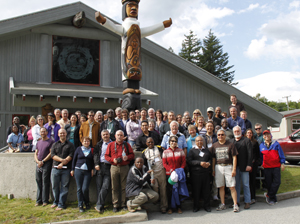In May 2020, the International Network for Environmental Compliance and Enforcement (INECE) will celebrate the 30th anniversary of its first international workshop that was held in Utrecht, Netherlands. In the 30 years since its foundation, we have witnessed an explosion in the development of environmental laws around the world. For example, according to the First Global Report on the Environmental Rule of Law, there has been a 38-fold increase in environmental legislation since 1972. Today, 176 countries around the world have framework environmental laws in place, and 164 have cabinet-level bodies charged with protecting the environment. This unprecedented growth in environmental legislation has been coupled with increased awareness of environmental challenges and principles, yet we continue to experience intensified ecological destruction, unmatched species loss, and rising greenhouse gas emissions. In the next 30 years, the environmental law community will need to focus its energy on improving compliance with existing laws if we are to rise to the challenges posed by impending environmental catastrophe.

To celebrate the past 30 years of legal developments and to prepare us for what the next 30 will bring, INECE, in partnership with the Australasian Environmental Law Enforcement and Regulators neTwork (AELERT), will host an international conference next March in Adelaide, Australia. As networks, INECE and AELERT actively seek to harness the power of cooperation, recognizing the reality that we are stronger through partnership. The theme of the joint conference, Environmental Collaboration: Shaping the Future of Regulation, Compliance, and Enforcement Together, will challenge our participants to consider the ways in which working together and sharing knowledge contributes to environmental protection at all levels. While this objective of collaboration is well-appreciated across the world, there is a need to share success stories and unpack challenges in order to work together effectively given the circumstances imposed by the ballooning complexity of environmental protection.
The conference will be organized into four streams: (1) current challenges and emerging threats; (2) collaboration across borders and barriers; (3) new frontiers; and (4) best in show. Each stream will hone in on different dimensions of collaboration and how they intersect with key issues in environmental compliance and enforcement. The first stream will focus on current regulatory and emerging environmental threats in different jurisdictions, including challenges to achieving compliance. The second stream looks at collaborative efforts and partnerships across borders, barriers, and spheres of government. The third stream will dive into the use of intelligence, technology, and data analytics to address environmental problems. Finally, the fourth stream will focus on achieving positive outcomes through best practice by highlighting success stories and how best to apply them.
While some sessions will focus on topics of particular interest to INECE, and others on topics of interest to AELERT, participants will be free to attend any session with no restrictions. As in previous conferences, we will kick off the AELERT-INECE conference with a day (March 10) during which we will offer capacity-building workshops and hold meetings for our sub-networks. This has traditionally offered a space for conference attendees to mingle before the sessions, plan meetings with partners from other parts of the world, and get a sense of what trainings INECE has to offer.
Prospective presenters are invited to make submissions along the four streams or any other topic that fits under our area of work before November 15. Submitters are encouraged to think outside of the box of conventional submissions. Creative submissions in alternative formats, such as idea pitches, short podcasts, and side activites are welcome. INECE and AELERT want to ensure participants of the conference are able to exchange experiences, build connections, and seek opportunities for collaboration. To that end, we ask that submitters keep even written submissions quite short such that we can truly plan interactive sessions throughout the entire week.
There will be many opportunities to engage in the conference, whether through submissions, exhibitions, sponsorship, or event hosting. More information on such opportunities, as well as further details about the conference, can be found at our conference website. We look forward to seeing you in Adelaide!
